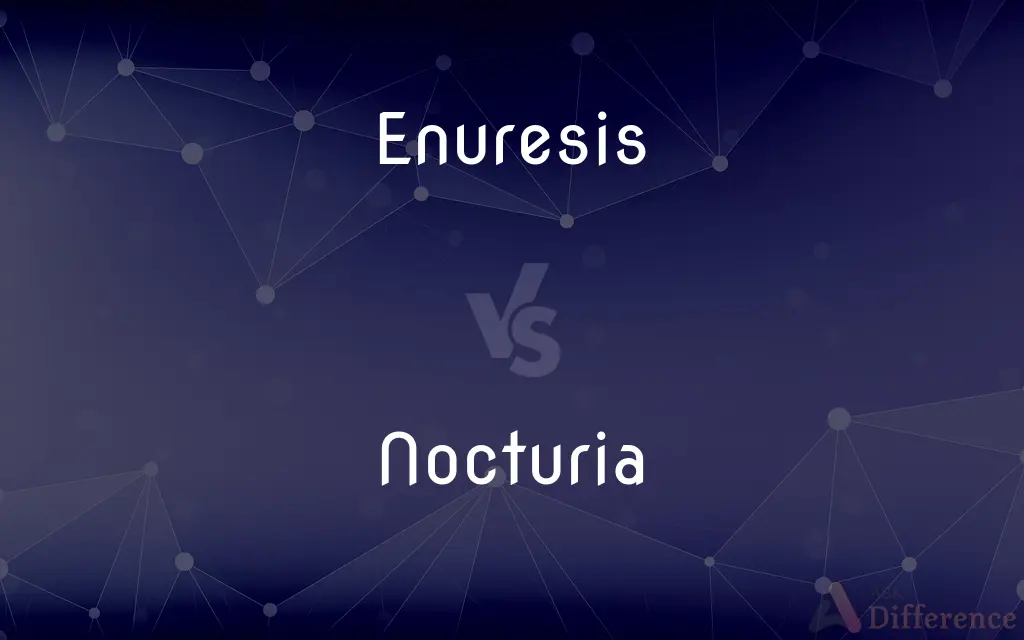Enuresis vs. Nocturia — What's the Difference?
By Tayyaba Rehman & Maham Liaqat — Updated on May 2, 2024
Enuresis refers to involuntary urination, often related to children, while nocturia describes frequent urination during the night affecting sleep in adults.

Difference Between Enuresis and Nocturia
Table of Contents
ADVERTISEMENT
Key Differences
Enuresis, commonly known as bedwetting, is typically seen in children and sometimes extends into adolescent years; it involves involuntary urination during sleep. Whereas nocturia is a condition predominantly affecting adults and the elderly, characterized by the need to wake several times at night to urinate, thereby disrupting sleep.
Enuresis is often linked to developmental stages in children or can be a sign of an underlying medical condition. On the other hand, nocturia can result from various causes such as urinary tract infections, bladder overactivity, or increased fluid intake before bed.
In terms of treatment, enuresis may be managed through behavioral interventions such as bladder training, moisture alarms, or, in some cases, medication. Whereas nocturia treatment focuses on addressing the underlying causes, adjusting nighttime fluid intake, and in some cases, prescribing medications that reduce urine production at night.
Enuresis is usually diagnosed based on the descriptions of incidents provided by parents, considering it often resolves with age. Nocturia, however, may require more thorough investigations like a diary of urination times and amounts, to pinpoint the reason and decide the appropriate treatment.
Enuresis does not typically affect the adult population unless it is a persistent condition from childhood or reoccurs due to specific health issues. Nocturia increases with age and is often seen as a part of aging due to decreased bladder capacity or increased production of urine at night.
ADVERTISEMENT
Comparison Chart
Definition
Involuntary urination in children during sleep.
Frequent urination at night affecting sleep.
Typical Age Group
Mainly children and adolescents.
Adults, especially older adults.
Primary Causes
Developmental issues, stress, urinary infections.
Aging, lifestyle factors, medical conditions.
Treatment Approaches
Behavioral techniques, alarms, sometimes meds.
Lifestyle changes, medications, treating causes.
Diagnosis
Mostly parental reports, medical consultation.
Urination diary, medical examination.
Compare with Definitions
Enuresis
A condition commonly outgrown with age.
Most cases of enuresis resolve by the teenage years.
Nocturia
Frequent awakening at night to urinate.
Nocturia often leads to fragmented sleep patterns.
Enuresis
Sometimes linked to emotional stress.
Enuresis can worsen during periods of stress at school.
Nocturia
Associated with various medical conditions.
Nocturia can indicate diabetes or heart disease.
Enuresis
Treatable with behavioral and/or pharmacological methods.
Enuresis is often managed using moisture alarms.
Nocturia
Common in elderly due to physiological changes.
As people age, nocturia becomes more frequent.
Enuresis
Diagnosed without invasive procedures.
Doctors typically diagnose enuresis based on history alone.
Nocturia
Treatment may involve medication.
Some medications can reduce the frequency of nocturia.
Enuresis
Involuntary nighttime urination in children.
Children with enuresis often require protective bedding.
Nocturia
Requires evaluation of fluid intake and diuretic use.
Reducing evening fluids can lessen nocturia symptoms.
Enuresis
Enuresis is a repeated inability to control urination. Use of the term is usually limited to describing people old enough to be expected to exercise such control.
Nocturia
Nocturia is defined by the International Continence Society (ICS) as “the complaint that the individual has to wake at night one or more times for voiding (i.e. to urinate).” The term is derived from Latin nox, night, and Greek [τα] ούρα, urine.
Enuresis
Involuntary urination, especially by children at night
Nocturnal enuresis can be due to a urinary tract infection
Nocturia
(medicine) A frequent need to arise during the night in order to urinate.
Enuresis
The involuntary discharge of urine; urinary incontinence.
Nocturia
Excessive urination at night; especially common in older men
Enuresis
Involuntary urination: urinary incontinence.
Enuresis
Such incontinence at nighttime, especially during sleep.
Enuresis
An involuntary discharge of urine; incontinence of urine.
Enuresis
Inability to control the flow of urine and involuntary urination
Common Curiosities
What is the main difference between enuresis and nocturia?
Enuresis is involuntary urination during sleep mostly in children, while nocturia involves frequent nighttime urination in adults.
What are common treatments for enuresis?
Treatments include moisture alarms, bladder training, and occasionally medication.
Can enuresis occur in adults?
Yes, but it is rare and usually continues from childhood or reoccurs due to specific conditions.
How is nocturia diagnosed?
Through patient history, urination diaries, and sometimes additional tests.
Is nocturia a normal part of aging?
It is more common with age but not necessarily normal; it often indicates underlying health issues.
What should I do if I experience nocturia?
Consult a healthcare provider to identify the cause and appropriate treatment.
Can nocturia be prevented?
Managing underlying conditions and lifestyle modifications can prevent or lessen symptoms.
Can lifestyle changes alleviate nocturia?
Yes, reducing fluid intake before bed and managing sleep hygiene can help.
How effective are moisture alarms for enuresis?
They are very effective as a part of behavioral interventions.
Is enuresis linked to psychological issues?
It can be, particularly if stress or anxiety is present.
Are there any specific exercises recommended for nocturia?
Pelvic floor exercises can improve bladder control and reduce nocturia.
Can medications for nocturia cause side effects?
Yes, some can cause electrolyte imbalances or other issues.
What role does diet play in managing enuresis?
Limiting caffeine and fluids before bedtime can help manage the condition.
At what age is enuresis typically resolved?
Most children outgrow enuresis by their early teenage years.
How does nocturia affect daily life?
It can significantly impact sleep quality and overall health.
Share Your Discovery

Previous Comparison
Harvesting vs. Cultivation
Next Comparison
Doorstep vs. DoorstopAuthor Spotlight
Written by
Tayyaba RehmanTayyaba Rehman is a distinguished writer, currently serving as a primary contributor to askdifference.com. As a researcher in semantics and etymology, Tayyaba's passion for the complexity of languages and their distinctions has found a perfect home on the platform. Tayyaba delves into the intricacies of language, distinguishing between commonly confused words and phrases, thereby providing clarity for readers worldwide.
Co-written by
Maham Liaqat















































